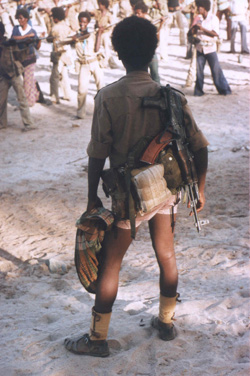Red Hand Day: The suffering of the child soldiers
Children are involved in numerous armed conflicts all over the world. Recent examples are Afghanistan, Burkina Faso, Chad, Centralafrican Republic, Cameroon, Colombia, the Democratic Republic of the Congo (DRC), India, Iraq, Israel / Palestine, Lebanon, Libya, Mali, Myanmar (Burma), Niger, Nigeria, Philippines, Somalia, South Sudan, Sudan, Syria and Yemen. Young soldiers' lives are often full of dangers and characterized by hard work, lack of food and drinking water. There is no health care but constant fear of being trapped in an ambush, landmine or gunfire. Discipline and obedience are enforced by brutal methods. Many children die under inhuman circumstances, others survive handicapped, blind or traumatized for the rest of their lives. However, boys are not the only ones at risk. Approximately one fifth of child soldiers are girls. They have to carry out the same tasks as the boys. And they are frequently victims of sexual violence and are forced to be the commanders' "wives" or sex slaves. Many are infected with HIV/AIDS or other sexually transmitted diseases and several become pregnant. In some cases they are stigmatized and have to live with their babies under extrem conditions. Boys are also victims of sexual violence, and in some countries they are particularly affected, for example in Afghanistan.
Their suffering is not over once these young people return home. Some discover that their families have been killed or their homes are destroyed. There is hardly a chance of finding a job or to return to school, and crime or prostitution seem to be the only alternatives. Many have to cope with physical disabilities. Communities may find it difficult to accept these former child soldiers, and the adolescents may reject community rules and traditions. Communities, families and former child soldiers need financial support and assistance to re-establish social structures and create opportunities to rebuild their lives.
On 12 February 2002 the Optional Protocol of the UN Convention on the Rights of the Child for the protection of children in armed conflict came into force. It outlaws the recruitment and use of children and adolescents under 18 in armed conflicts. This Optional Protocol has been accepted by more than 170 governments. Armed groups and regular government forces, however, continue to recruit and use child soldiers. Most of them have been recruited by force and cannot leave the armed unit anymore. Other children who grow up in war zones see no other chance of survival than joining one of the armed groups "voluntarily". While many child soldiers are between 10 and 18 years old, sometimes they are even younger.
